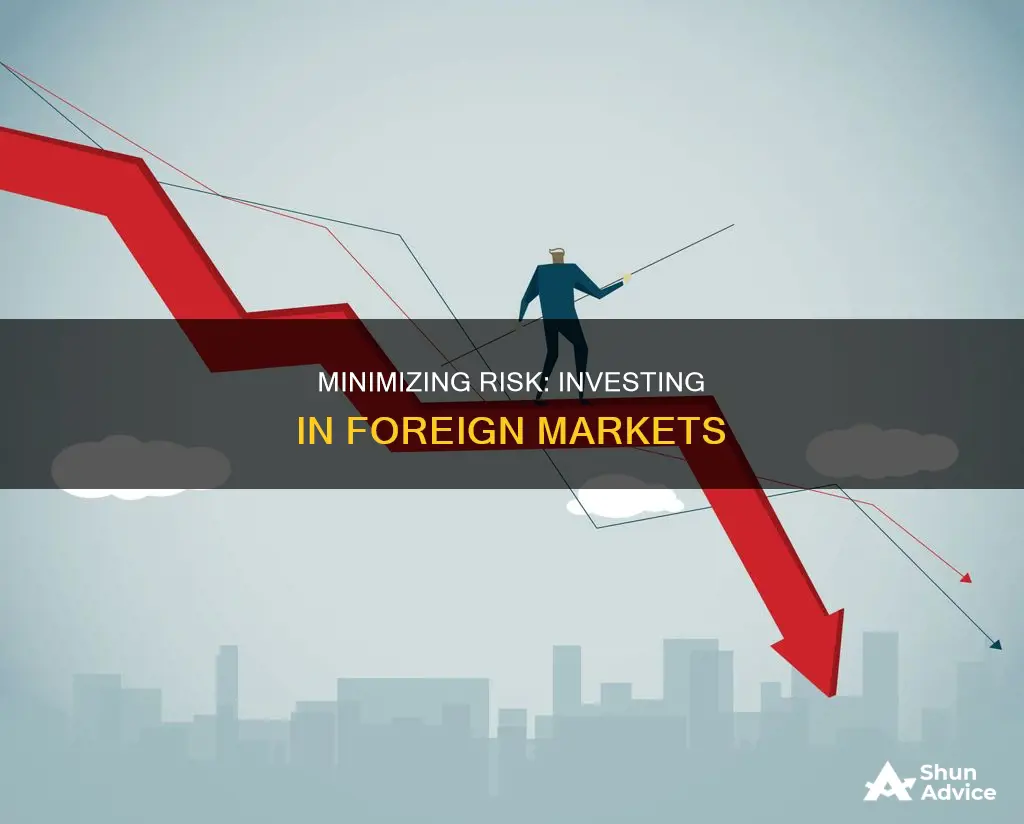
Investing in a different country can expose your portfolio to risks associated with domestic economic and political events, such as recessions, policy changes, and natural disasters. However, diversifying your investments across different countries and regions can help to reduce overall risk and potentially increase returns. Before investing in international markets, it is important to research and analyze the economic and political stability, currency exchange rates, and interest rate policies of the countries in question.
What You'll Learn

Understand the economic and political risks of the country
Understanding the economic and political risks of a country is crucial before investing. Country risk refers to the uncertainty of investing in a particular country and the potential for losses due to various factors. Here are some essential points to consider:
Economic Risk
Economic risk pertains to a country's ability to repay its debts and the stability of its finances and economy. A strong economy and stable finances indicate a more reliable investment opportunity. When evaluating economic risk, consider the following:
- Assess the country's economic fundamentals, including its gross domestic product (GDP), inflation rates, and consumer price index (CPI) readings.
- Evaluate the structure of the country's financial markets and the availability of attractive investment alternatives.
- Monitor the performance of local stock and bond markets to make informed decisions.
- Understand the country's ability to honour its financial commitments. This is particularly important for emerging markets or countries with severe deficits.
- Consider the impact of currency exchange rates on your investments. Currency depreciation can affect your returns, especially when investing in foreign countries.
Political Risk
Political risk refers to the decisions and policies made within a country that may impact investors. It also encompasses the willingness of a country to maintain a favourable climate for outside investment. Here are some factors to consider:
- Evaluate the political stability of the country. Understand the forces and dynamics that shape the country's politics, especially for emerging markets.
- Analyse the government's ability to implement policies and enforce laws, even in the face of unexpected shocks or crises.
- Consider the potential impact of political decisions on your investments. Unfavourable policies or a hostile political climate towards outside investors may deter investment.
- Stay informed about the potential for unexpected political developments, especially in emerging markets.
- Assess the effectiveness of institutions and governance, as well as the country's political relationships with other nations.
By thoroughly understanding and evaluating the economic and political risks associated with investing in a foreign country, you can make more informed decisions and potentially minimise risks.
Understanding VAT on Investment Management Fees: What's the Deal?
You may want to see also

Research the liquidity of the market
Liquidity refers to the efficiency or ease with which an asset or security can be converted into cash without affecting its market price. The more liquid an asset is, the easier and more efficient it is to turn it back into cash.
There are two main types of liquidity: market liquidity and accounting liquidity. Market liquidity refers to the extent to which a market, such as a country's stock market or a city's real estate market, allows assets to be bought and sold at stable, transparent prices. A market with high liquidity usually means better spreads as more transactions are being made.
Accounting liquidity measures the ease with which an individual or company can meet their financial obligations with the liquid assets available to them—in other words, their ability to pay off debts as they come due.
When researching the liquidity of a foreign market, it is important to consider the following:
- The specific assets or securities being considered for investment. For example, stocks, bonds, and other exchange-traded securities are generally more liquid than tangible items such as real estate, fine art, or collectibles.
- The level of development of the country: Developed markets are generally considered safer investment destinations and have lower levels of country risk compared to emerging or frontier markets.
- The economic and financial fundamentals of the country: This includes metrics such as gross domestic product (GDP), inflation, and consumer price index (CPI) readings.
- The structure of the country's financial markets, the availability of attractive investment alternatives, and the recent performance of local stock and bond markets.
- The potential impact of political decisions and the overall political climate on investments.
- The liquidity of specific investments within the market: This can be assessed by considering factors such as trading volume, bid-ask spreads, market depth, and order book data.
By researching and understanding the liquidity of a foreign market, investors can make more informed decisions and better manage their investment risks.
Salesforce's Indy Investment: A Strategic Move for Growth
You may want to see also

Consider the costs of international investments
International investments can be more expensive than investing in domestic companies, and there are several costs to consider.
Firstly, there is the foreign exchange risk. Fluctuations in currency exchange rates can impact the value of your investments when converted back to local currency. A strengthening currency can erode returns, while a weakening one may increase them.
Secondly, differing regulations and tax implications can add complexity and cost. Varying regulatory frameworks, tax reporting requirements, and legal systems in different countries can be time-consuming and costly to navigate and comply with.
Thirdly, international investments often come with higher transaction costs, including currency conversions, broker fees, custodian charges, and regulatory compliance expenses.
Finally, there is the cost of accessing information. Many companies outside the US do not provide investors with the same type of information as US public companies, and the information may not be available in English. This can make it challenging to make informed investment decisions.
It is important to carefully consider these costs when deciding on the allocation of investment capital and to seek professional advice where necessary.
Shareholders' Equity: Does It Reflect Shareholder Investment?
You may want to see also

Be aware of currency exchange rates and controls
When investing in a foreign country, it's important to be aware of the impact of currency exchange rates and controls. Currency exchange rates refer to the value of one country's currency in relation to another. These rates fluctuate over time due to various economic factors and can significantly impact the returns on your investments. For example, if you invest in a Canadian stock in Canadian dollars, and the share value increases, you may still lose money if the Canadian dollar depreciates relative to your domestic currency. Therefore, it is crucial to monitor exchange rates and factor them into your investment decisions.
Additionally, some countries implement exchange controls, which are government-imposed limitations on the purchase and sale of currencies. These controls aim to stabilize a country's economy by managing the flow of currency in and out of the country, which can affect exchange rate volatility. Exchange controls can be enforced through various methods, such as banning certain foreign currencies, imposing fixed exchange rates, or restricting foreign exchange transactions to government-approved entities. It is important to be aware of any exchange controls in the country you are investing in, as they can impact your ability to invest and repatriate profits.
To minimize the risk associated with currency exchange rates, investors can consider the following strategies:
- Diversification: Diversifying your investment portfolio across multiple countries and currencies can help reduce the impact of fluctuations in any single currency.
- Hedging: Using financial instruments, such as forward contracts, can help protect against currency fluctuations by locking in an exchange rate for a future transaction.
- Country Analysis: Conducting a thorough analysis of the economic and political climate of the country you are investing in can help anticipate potential changes in exchange rates.
- Currency Risk Management: Regularly monitoring exchange rates and staying informed about market trends can help you make timely investment decisions and manage your currency exposure.
By being mindful of currency exchange rates and controls, you can make more informed investment decisions and minimize the risk associated with foreign investments.
Strategies for Taking Control of Your Investment Portfolio
You may want to see also

Diversify your investments across multiple countries
Diversifying your investments across multiple countries is a prudent strategy to reduce risk and enhance your portfolio's resilience. Here are some key points to consider:
Understanding Country Risk
Before investing in a foreign country, it is crucial to evaluate the country risk, which refers to the economic, political, and business risks unique to that nation. These risks can lead to unexpected investment losses. Developed markets like the US, Canada, France, Japan, and Australia are generally considered safer investments due to their stable economies and political systems. However, they may offer lower growth potential compared to emerging markets.
Benefits of Diversification
Diversification is a strategy that involves spreading your investments across different countries, sectors, and asset classes. By investing in multiple countries, you reduce the risk of having all your investments affected by country-specific factors such as economic downturns or political instability. Diversification can provide access to emerging markets, innovative technologies, and industries not available in your home market.
Research and Expert Advice
Thorough research is essential before venturing into foreign markets. Analyze the economic and political stability, financial regulations, and historical market performance of the countries you are considering. Seek advice from financial experts or investment advisors with experience in international investing. They can provide valuable insights and help you navigate the complexities of foreign markets.
Investment Vehicles
There are various investment vehicles to consider when diversifying across multiple countries:
- Exchange-Traded Funds (ETFs): ETFs offer exposure to foreign markets and provide diversification without the need to buy individual stocks in each country.
- Global Mutual Funds: These funds are managed by professionals with expertise in international markets and allow you to spread risk across multiple countries and industries.
- Foreign Stock Investment: Directly investing in foreign stocks gives you individual ownership of shares in foreign companies, providing more control and the potential for higher returns if you choose promising companies.
- Currency Hedging: Currency fluctuations can significantly impact returns, so consider using hedging techniques to offset potential losses due to exchange rate movements.
- Staggered Investments: Instead of investing a lump sum, consider staggering your investments over time to mitigate the risk of investing a large amount when markets are at their peak.
Monitoring and Rebalancing
Stay informed about global news and events that may affect your investments. Regularly review your portfolio and make adjustments as needed to maintain a comfortable level of risk. Remember that diversification is an ongoing process, and you may need to rebalance your portfolio periodically to ensure it aligns with your risk tolerance and investment goals.
Adjusting Your Acorns Investment Portfolio: A Quick Guide
You may want to see also
Frequently asked questions
The first step is to determine the riskiness of the investment climate in the country. This includes evaluating the economic, political, and business risks unique to the country that might result in unexpected investment losses.
The three main risk sources are economic risk, political risk, and foreign exchange risk. Economic risk refers to a country's ability to pay back its debts. Political risk refers to decisions or policies that may result in losses for investors. Foreign exchange risk is the risk of currency depreciation affecting the value of your investment.
You can assess country risk through various metrics and studies, including sovereign credit ratings, independent sovereign risk reports, and country risk surveys. These tools consider factors such as economic and political stability, debt service ratios, and import/export ratios.
International investing offers diversification and growth opportunities. By investing in foreign countries, you can spread your investment risk and take advantage of the growth potential in emerging markets.
International investing carries additional risks and challenges, including access to information, higher costs, currency exchange rate fluctuations, political and economic events, liquidity differences, and legal complexities.







